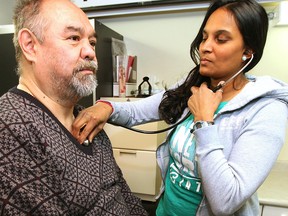Quebec bill forcing young MDs to stay in public system for first five years treats symptoms of a health-care crisis — not the diagnosis, doctor says.

Quebec’s proposed law forcing young doctors to stay in the public system for their first five years is little more than political “virtue signalling,” says the vice-president of an association of Montreal general practitioners.
Dr. François-Pierre Gladu, a family physician and vice-president of the Association des médecins omnipraticiens de Montréal, argued the proposed law fails to address the systemic issues driving doctors out of the public sector and even out of the province.
“Doctors are just five per cent of health professionals. Why are they targeting doctors? It’s clearly political. It’s clearly virtue signalling,” Gladu said.
“But it also doesn’t address the main problem: Why are all these professionals not applying for those vacant posts? Why are they going to the private sector?”
The bill, introduced Tuesday by Health Minister Christian Dubé, would fine doctors who leave the public system during their first five years of practice between $20,000 and $100,000 per day, with steeper penalties for repeat offenders.
The government justified the legislation by citing a 70 per cent increase in the number of doctors opting out of the public insurance plan (RAMQ) since 2020. Currently, it said, 774 of Quebec’s 22,479 licensed doctors operate outside the public Medicare system.
Quebec also faces a long-term brain drain: 2,300 physicians trained in the province have moved to Ontario over the past 20 years, despite the high cost — between $435,000 and $790,000 — of training each doctor.
Le Devoir reported that this cost, however, includes paying residents who work in hospitals — an expense that Gladu argues is not a government burden but rather a cost tied to the services residents provide in hospitals.
“If we didn’t have residents, we wouldn’t have hospitals. We would have to cut off the beds,” he said.
He warned the proposed law could deter aspiring doctors from practising in Quebec and push experienced physicians out of the public system altogether.
“For older doctors, it’s probably going to make them think twice about staying in the public sector, because I read that law as a signal that they’re not serious about giving patients what they need,” he said.
“In other words, it might have the exact opposite effect of what the government wants.”
Instead, Gladu said, Quebec should look to other provinces like British Columbia and New Brunswick, which he said are doing a better job of attracting health professionals.
The bill comes on the heels of a sweeping reform that consolidated the province’s health system into a single authority, Santé Québec, which aims to improve efficiency. But critics, including health care unions, fear the centralized structure will be disconnected from frontline realities.
The Fédération des médecins résidents du Québec, representing 4,000 medical residents, called it a “legislative weapon” targeting a minority, while the Fédération des médecins spécialistes du Québec, which represents 11,000 specialists, warned the government that the law could harm young doctors’ careers.
The Collège des médecins du Québec, however, has endorsed the legislation, having previously advocated for such measures.
[related_link /]